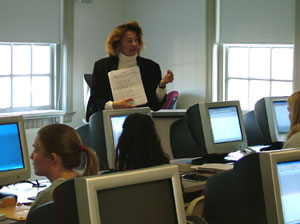Social Work – Major
 The Social Work Program at Cedar Crest College is dedicated
to the provision of the highest quality
educational preparation of students for entry into beginning
social work practice with individuals, families,
groups, organizations and communities. Consistent with the
mission of the College, the Social Work Program
seeks to provide students with a liberal arts perspective and
a particular focus on the development of women. The
Social Work Program is philosophically guided by a holistic
approach to practice that includes the spiritual
dimension of the human condition. The program is also committed
to preparing professionals who will work to
alleviate poverty, oppression, and discrimination through a
dedicated advocacy for social and economic justice.
The Social Work Program at Cedar Crest College is dedicated
to the provision of the highest quality
educational preparation of students for entry into beginning
social work practice with individuals, families,
groups, organizations and communities. Consistent with the
mission of the College, the Social Work Program
seeks to provide students with a liberal arts perspective and
a particular focus on the development of women. The
Social Work Program is philosophically guided by a holistic
approach to practice that includes the spiritual
dimension of the human condition. The program is also committed
to preparing professionals who will work to
alleviate poverty, oppression, and discrimination through a
dedicated advocacy for social and economic justice.
The Social Work Program is accredited by the Council on Social Work Education and is designed to provide students with a generalist approach to social work practice. Students who complete the major outlined below will be prepared for a beginning professional social work practice and usually are awarded advanced standing in graduate social work study.
Cedar Crest College limits this accreditation to those students who have completed the required foundation and professional courses, who have achieved at least a C in each of the professional courses, who have achieved a 2.0 or better cumulative grade-point average in the foundation courses, and who have otherwise satisfied the College’s requirements for graduation.
Each student’s academic progress and ability to remain in the program is regularly monitored by the social work faculty. A formal review of the student’s status occurs in the spring term of the junior year to evaluate her preparation for the senior field education experience (Social Work 339). Acceptance is based on overall academic course work and particularly on performance in Social Work 327 (a C or better), which is normally taken in the junior year.
Recent social work graduates of Cedar Crest College have been employed as medical social workers in hospitals, as social workers in nursing homes, as psychiatric social workers in mental health settings, as counselors in substance abuse and family service agencies, as employee assistance counselors in occupational settings, and as social workers in child welfare, day care, and Head Start agencies.
Capstone Experience
The capstone experience for the social work program will be the required field practicum (SWK 339, Field Education in Social Work I) in which students apply theoretical knowledge gained from professional social work courses as well as from numerous liberal arts foundation courses they have completed. This course consists of a 450-hour field placement at a social service agency during the student’s senior year. Students also are required to attend a weekly one-hour class to discuss the development of learning agreements with their respective agency field educators, administration in social work, and spirituality in social work practice.
Concurrent with the field education experience students are required to take SWK 345, Field Education Seminar I, in the fall semester and SWK 346, Field Education Seminar II, in the spring semester. Each of these courses integrates theoretical knowledge students have gained in the classroom with the experiential learning taking place during the field education and are part of the capstone experience.
Requirements for the Major in Social Work
The major in social work consists of the following foundation courses:
- ANT 100 Cultural Anthropology 3 credits
- SOC 100 Introduction to Culture and Society 3 credits
- SOC/SWK 313 Minorities and Human Relations 3 credits
- SOC 321 The Family as a Social Institution 3 credits
- PSY 100 General Psychology 3 credits
- PSY 250 Life-Span Development 3 credits
- SPS 261 Understanding and Using APA
Plus the following required professional courses:
- SWK 201 Introduction to Social Work 4 credits
- SWK 202 The Social Welfare Institution 3 credits
- SWK 243 Social and Psychological Aspects of Aging 4 credits
- SWK 300 Community Organizing and Social Planning 3 credits
- SWK 303 Human Behavior and the Social Environment 3 credits
- SWK 324 Social Science Statistics 3 credits
- SWK 325 Social Work Research Methods and Design 4 credits
- SWK 326 Evaluating Social Work Research 4 credits
- SWK 327 Social Work Processes: Individuals, Families, Groups 4 credits
- SWK 328 Poverty and Income Redistribution 3 credits
- SWK 329 Generalist Social Work Practice 3 credits
- SWK 339 Field Education in Social Work I (Capstone Experience) 9 credits
- SWK 345 Field Education Seminar I (Capstone Experience) 3 credits
- SWK 346 Field Education Seminar II (Capstone Experience) 3 credits
Additional Requirements
Social work students are required to demonstrate proficiency in Math 102, College Mathematics, and take Sociology 324 or an upper-level mathematics course. Students who are not computer literate must take computer science. To fulfill their scientific reasoning requirement, social work students must take Biology 111, The Human Agenda: Environment, and BIO 112, The Human Agenda: Health Issues, in their freshman or sophomore year. Students transferring from other programs who have completed upper level biology courses may be exempted from this requirement with the approval of the faculty. Students should also select PSC 250, American Political Thought.
